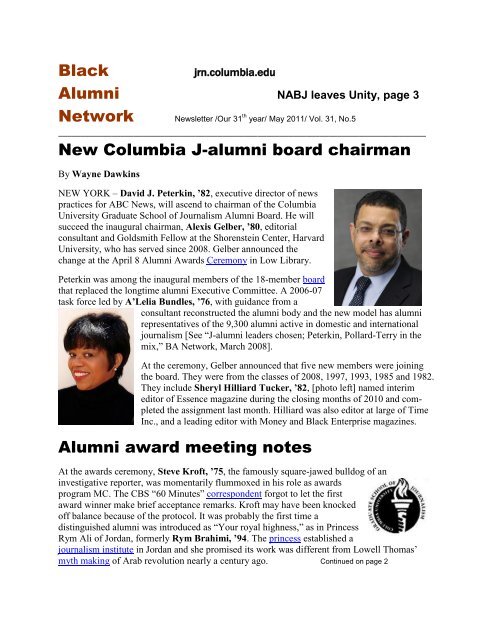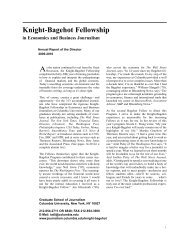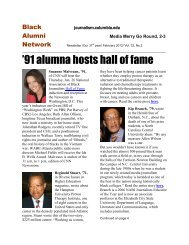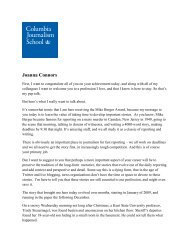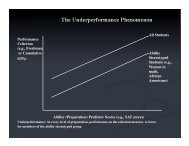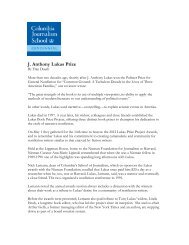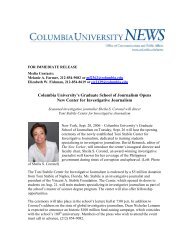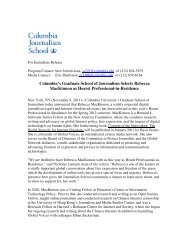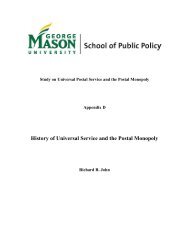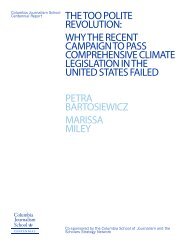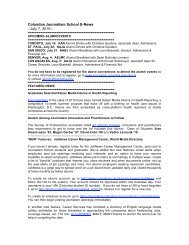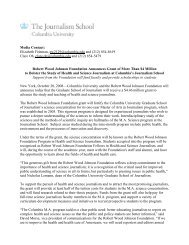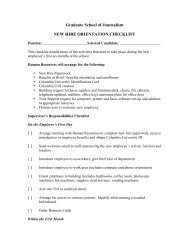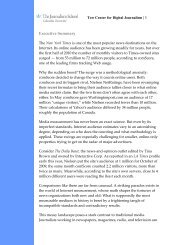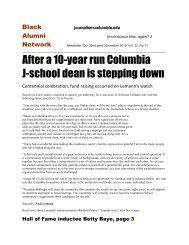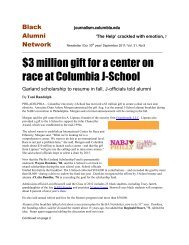Black Alumni Network New Columbia J-alumni board chairman ...
Black Alumni Network New Columbia J-alumni board chairman ...
Black Alumni Network New Columbia J-alumni board chairman ...
Create successful ePaper yourself
Turn your PDF publications into a flip-book with our unique Google optimized e-Paper software.
<strong>Black</strong><br />
jrn.columbia.edu<br />
<strong>Alumni</strong> NABJ leaves Unity, page 3<br />
<strong>Network</strong><br />
<strong>New</strong>sletter /Our 31 th year/ May 2011/ Vol. 31, No.5<br />
___________________________________________________________________________________<br />
<strong>New</strong> <strong>Columbia</strong> J-<strong>alumni</strong> <strong>board</strong> <strong>chairman</strong><br />
By Wayne Dawkins<br />
NEW YORK – David J. Peterkin, ’82, executive director of news<br />
practices for ABC <strong>New</strong>s, will ascend to <strong>chairman</strong> of the <strong>Columbia</strong><br />
University Graduate School of Journalism <strong>Alumni</strong> Board. He will<br />
succeed the inaugural <strong>chairman</strong>, Alexis Gelber, ’80, editorial<br />
consultant and Goldsmith Fellow at the Shorenstein Center, Harvard<br />
University, who has served since 2008. Gelber announced the<br />
change at the April 8 <strong>Alumni</strong> Awards Ceremony in Low Library.<br />
Peterkin was among the inaugural members of the 18-member <strong>board</strong><br />
that replaced the longtime <strong>alumni</strong> Executive Committee. A 2006-07<br />
task force led by A’Lelia Bundles, ’76, with guidance from a<br />
consultant reconstructed the <strong>alumni</strong> body and the new model has <strong>alumni</strong><br />
representatives of the 9,300 <strong>alumni</strong> active in domestic and international<br />
journalism [See ―J-<strong>alumni</strong> leaders chosen; Peterkin, Pollard-Terry in the<br />
mix,‖ BA <strong>Network</strong>, March 2008].<br />
At the ceremony, Gelber announced that five new members were joining<br />
the <strong>board</strong>. They were from the classes of 2008, 1997, 1993, 1985 and 1982.<br />
They include Sheryl Hilliard Tucker, ’82, [photo left] named interim<br />
editor of Essence magazine during the closing months of 2010 and completed<br />
the assignment last month. Hilliard was also editor at large of Time<br />
Inc., and a leading editor with Money and <strong>Black</strong> Enterprise magazines.<br />
<strong>Alumni</strong> award meeting notes<br />
At the awards ceremony, Steve Kroft, ’75, the famously square-jawed bulldog of an<br />
investigative reporter, was momentarily flummoxed in his role as awards<br />
program MC. The CBS ―60 Minutes‖ correspondent forgot to let the first<br />
award winner make brief acceptance remarks. Kroft may have been knocked<br />
off balance because of the protocol. It was probably the first time a<br />
distinguished <strong>alumni</strong> was introduced as ―Your royal highness,‖ as in Princess<br />
Rym Ali of Jordan, formerly Rym Brahimi, ’94. The princess established a<br />
journalism institute in Jordan and she promised its work was different from Lowell Thomas’<br />
myth making of Arab revolution nearly a century ago. Continued on page 2
<strong>Black</strong> <strong>Alumni</strong> <strong>Network</strong> May 2011 Page 2<br />
<strong>Alumni</strong> award meeting notes/Continued<br />
Bruce Brugmann, ’58, founder of the San Francisco Bay Guardian, accepted his inscribed<br />
silver bowl then made a virile call to arms for watchdog journalism. ―There is a role for the<br />
little guy these days,‖ he said and then referenced 131 alternative papers with a combined<br />
6 million circulation as the only real alternative to monopoly daily newspapers that often behave<br />
like utility companies. Robert Shaw, ’66, a longtime editor in the mainstream media, was no<br />
less ferocious. The Orlando Sentinel government and politics editor warned the 125 people in<br />
attendance that access to public records was under siege in the digital age under the cover of<br />
protecting trade secrets and personal security.<br />
In this age of tweeting, texting and indoor phone work, Shaw fondly recalled advice from<br />
his professor to hit the streets for face time with sources: ―A good reporter,‖ Penn Kimball<br />
counseled, ―can talk to anybody. All it takes is one good question‖<br />
Rehema Ellis, ’77, accepted her award with son Khori, 8, by her side.<br />
Ellis’ national and overseas work as a NBC correspondent has taken her<br />
away from Khori, but her son assured her, ―Yes mommy, you can do your<br />
job.‖ Ellis, who covers education, referenced Diane Ravitch’s book about<br />
the ―quiet crisis‖ in public education. ―Will we get this right?‖ Ellis asked<br />
the audience. We’ll see.<br />
Persia Walker, ’83, was among the<br />
dozens of <strong>alumni</strong> authors promoting<br />
their books during the reception after<br />
the April 8 <strong>Alumni</strong> Awards<br />
ceremony.<br />
In Walker’s ―<strong>Black</strong> Orchid Blues,‖<br />
protagonist Lanie Price is a society<br />
columnist in 1920s Harlem.<br />
Is this historical fiction intriguing<br />
enough for you?
<strong>Black</strong> <strong>Alumni</strong> <strong>Network</strong> May 2011 Page 3<br />
<strong>Black</strong> journalists walk away<br />
from Unity coalition<br />
By Wesley Lowery<br />
PHILADELPHIA — After months of tension, the National Association of <strong>Black</strong> Journalists has<br />
severed its relationship with Unity: Journalists of Color, and will host its own convention<br />
in 2012 rather than participate in the coalition’s joint gathering in Las Vegas.<br />
The decision, approved by NABJ’s <strong>board</strong> of directors at its April 9-10 meeting, removes the<br />
organization from Unity, a four-organization alliance that NABJ members helped establish<br />
nearly 20 years ago.<br />
Unity Inc. is a fifth association that serves as coordinator to the four associations.<br />
NABJ leaders present and past have questioned its relevance and fiscal discipline.<br />
The alliance — which brings together NABJ, the National Association of<br />
Hispanic Journalists, Asian American Journalists Association and the Native<br />
American Journalists Association — holds a joint convention about every four<br />
years with each of the organizations splitting the revenue. The first joint<br />
convention was 1994 in Atlanta, followed by 1999 in Seattle, 2004 in<br />
Washington, D.C. and 2008 in Chicago.<br />
NABJ <strong>board</strong> members have made it no secret that they aren’t happy with the way<br />
the Unity organization divided the pot.<br />
Rather than continue with the current revenue sharing model, which gives Unity a substantial<br />
share of the convention revenue, NABJ proposed a new model that would take money away<br />
from the umbrella group and give more to each of the journalists of color organizations.<br />
NABJ <strong>board</strong> members also voiced concern over Unity’s governance model — arguing that the<br />
black journalists association should receive more representation because it accounts for the<br />
majority of Unity convention attendees, i.e. 52 percent at the 2008 Chicago convention.<br />
And when Unity’s <strong>board</strong> of directors voted down NABJ’s proposal last winter, NABJ leaders<br />
made it clear they were considering whether to pull out of the alliance.<br />
Past NABJ president Bryan Monroe [2005-2007], a former Unity <strong>board</strong> member, traveled to<br />
Philadelphia so he could make one final plea to NABJ’s <strong>board</strong>.<br />
―I’d hate for people to look back and say today was the beginning of the end for minority<br />
journalism organizations,‖ Monroe appealed to the <strong>board</strong>. But his efforts were in vain.<br />
Continued on page 4
<strong>Black</strong> <strong>Alumni</strong> <strong>Network</strong> May 2011 Page 4<br />
NABJ-Unity breakup/Continued<br />
After spending more than an hour in closed-door executive session, the <strong>board</strong> voted 12-1<br />
April 10 to leave the Unity alliance. NABJ parliamentarian Tonju Francois was the only<br />
<strong>board</strong> member to vote against leaving the alliance.<br />
In its statement announcing the decision, NABJ said that Unity’s business model was<br />
―no longer is the most financially prudent for NABJ and its membership.‖ As people throughout<br />
the journalism industry reacted to NABJ’s announcement, the organization has worked to<br />
position itself for its 2012 convention, announcing that there are nine finalist cities.<br />
Meanwhile, some members of the three remaining Unity organizations seemed blindsided<br />
by the announcement as their leaders expressed continued support for the alliance<br />
with NABJ — even if it is no longer part of Unity.<br />
―I understand that this is a business decision, that the NABJ <strong>board</strong> members are doing what they<br />
think is best for their organization. And I wish them well.‖ said Joanna Hernandez, Unity<br />
president, in a statement. ―Although the NABJ <strong>board</strong> has made this decision, we will never shut<br />
the door nor turn our backs on our friends and colleagues.‖<br />
The writer is a student at Ohio University and a two-time Unity and NABJ student project journalist.<br />
The <strong>Black</strong> <strong>Alumni</strong> <strong>Network</strong> of <strong>Columbia</strong> University Graduate School of Journalism was founded in May 1980 and since July<br />
the group has published a monthly newsletter. The BA <strong>New</strong>sletter’s mission is to keep people connected. We publish job<br />
changes and moves, news about books and films published or produced by <strong>alumni</strong>, and family milestones. And of course we<br />
keep <strong>alumni</strong> connected to news from the <strong>Columbia</strong> GSJ. Log on to our Web site at www.jrn.columbia.edu/<strong>alumni</strong>/services/ban/<br />
or see our link on the home page of www.blackjournalist.com Wayne J. Dawkins – editor, Betty Winston Baye, Kip Branch,<br />
Kissette Bundy, Toni Randolph, Cheryl Devall, Dan Holly, Keith Rushing, contributing editors<br />
E-mail tips, comments, suggestions to wdawk69643@aol.com<br />
THANK YOU new and renewing subscribers. PayPal is an option in addition to checks. Ask for ―August Press.‖<br />
<strong>Black</strong><br />
<strong>Alumni</strong><br />
<strong>Network</strong><br />
108 Terrell Road<br />
P.O. Box 6693<br />
<strong>New</strong>port <strong>New</strong>s, VA 23606<br />
Subscriptions:<br />
$25 one year<br />
$40 two years


